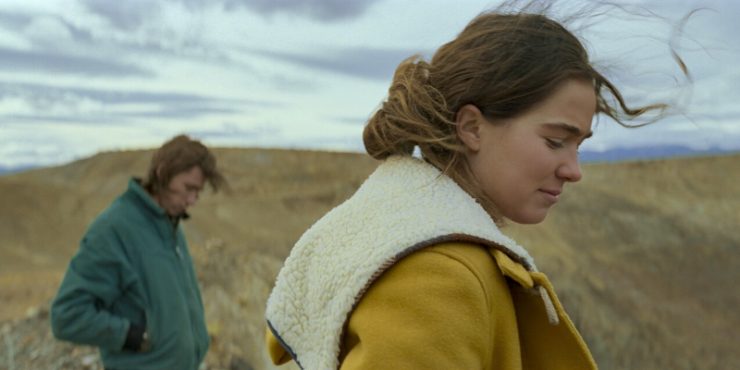In a scene boosted by stunning scenic imagery in the second half of Montana Story, one of our main characters (played by Haley Lu Richardson) speaks of the indoctrination she received as a child for natural wonder. This was the top of the heap: the expansive beauty of the Montana skyline. By this time, she has been living in upstate New York and is coming home for the first time in seven years. For her, Montana is associated with a painful past she still hasn’t recovered from, and its breathtaking landscapes now feel like a hollow facade meant to distract from a history of trauma and abuse.
This is a consistent contrast throughout Montana Story, explicit Big Sky porn as background for a maudlin family melodrama. Richardson plays Erin, a cook who’s returned to Montana since running away as a teenager. Her father lies on his deathbed after a stroke, his face covered by a breathing mask, his body kept alive by machines. Erin’s brother, Cal (Owen Teague), is trying to tie up loose ends as his dad reaches his end. Troubles with bankruptcy complicate things. Their sprawling ranch must be sold, debts must be paid. The family horse, named Mr. T, must be put down. Cal has also spent the last seven years looking for Erin, so when she arrives, there’s much more than surprise roiling inside of him.
The film’s first forty-five minutes plays coy on the hard details of Erin’s sordid history with her incapacitated father, setting the stage for a reveal that is foisted upon Teague’s Cal in a monologue that feels contrived and sloppy. Cal is speaking to his father’s hospice nurse, Ace (a wonderful Gilbert Owuor, ensnared in a not-so-wonderful role), when he decides to spill the beans on exactly how his coma-ridden father was once the villain that chased his sister away. The information is hoarded in a way that presumes shocking monstrosity when the reality is actually a tale of civic malfeasance. A violent act is also unveiled in a way that feels shoehorned to prop up the more ethical missteps. By the time we get here, it feels like a bit of a bait and switch.
Which perhaps it is, as Montana Story spends a lot of time making allusions to the pernicious presence of white people on Indigenous land. This unseen father (the actor is left uncredited) is more than just an abusive parent, but also a perpetuator of colonialist exploitation. Their gorgeous, secluded ranch is maintained mostly by Valentina (Kimberly Guerrero), a native woman whose son, Joey (Asivak Koostachin), pleads with Cal not to sell the land. Joey and his mother’s place there has survived several white owners, but Cal’s economic desperation may cause that streak to end. Snippets of background radio news talks of pipelines infringing on Indigenous land; it doesn’t play directly into the plot but instead provides background context on this mawkish family tale.
The handling of themes throughout Montana Story has a heavy-handedness that suggests a debut filmmaker, but writer-directors Scott McGehee and David Siegel have been making films for close to three decades. 2001’s The Deep End was a critical breakthrough for the now-legendary Tilda Swinton, but most of their films (Bee Season, What Maisie Knew) have that whiff of American indie anonymity, where you wonder if you’d ever meet someone who’s actually seen these movies. Montana Story probably has the same fate ahead of it. One struggles to find something singularly special about this film. Its themes are too broad and its plot points easy to suss out way before they happen.
For a while it seems like this movie is going to be about Erin taking Mr. T with her to New York, to save him from being euthanized. This is a red herring in the narrative, though at least it leads to the film’s most interesting sequence. In search for a truck and a trailer to relocate the horse, Erin and Cal meet Mukki (Eugene Brave Rock), an Indigenous man whose own people come from the same upstate area Erin plans to go back to. This is the one moment in Montana Story where the narrative threads seem to connect. Erin had the benefit of running away to New York to escape her father’s wrath, but natives like Mukki and Valentina have little choice but to accept their vulnerability to the cruel white men who arrive on their land. Brave Rock’s supporting performance is the best in the entire film.
This movie has two real resources: the beauty of its rural locale and its lead actress. Haley Lu Richardson is like the cool kid’s Florence Pugh; a versatile young actor whose smallness in stature betrays a largeness in emotional scope. Erin feels hollow on the page but Richardson does find moments of grace throughout the film, confirming her enormous talent and elevating Montana Story in moments where it is very necessary. Her scenes with Teague bubble with a tension that feels like true sibling turmoil. This is a well-meaning film brought down by its moroseness, and while it has one of our best young actors at the forefront, that’s not enough to pull it out of the muck.
Written and Directed by Scott McGehee and David Siegel










